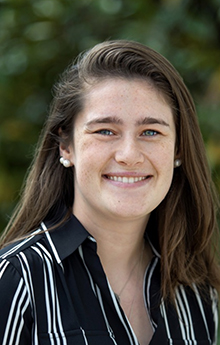 Global Terrorism Database (GTD) Researcher and Targets Classification Domain Manager Amy Iandiorio describes herself as “one of the many New Jersey transplants into the DMV area.” She holds a bachelor’s degree with Honors in Criminology and Criminal Justice, with minors in Global Terrorism Studies and History, from the University of Maryland, College Park.
Global Terrorism Database (GTD) Researcher and Targets Classification Domain Manager Amy Iandiorio describes herself as “one of the many New Jersey transplants into the DMV area.” She holds a bachelor’s degree with Honors in Criminology and Criminal Justice, with minors in Global Terrorism Studies and History, from the University of Maryland, College Park.
How did you first hear about or get involved with START?
I think my earliest awareness of START came before I ever enrolled in the University of Maryland (UMD), because I considered START to be one of UMD’s many advantages, and a good reason to attend. Once I was a student I wanted to enroll in the Global Terrorism Studies Minor as soon as I was eligible, and started the minor with my cohort in Fall 2017, while interning on the GTD that same semester.
Is there a current hole in research that you’re interested in studying?
I find the intersection of gender and extremism interesting, specifically male supremacist and Incel ideologies and violence. I have had the opportunity to read primary source documents and forums of Incels, and find their unique vocabulary and glorification of violence both concerning and intriguing as a researcher. Misogyny and gender-based bias is an element of ideologies across the extremist spectrum, and recent measures by law enforcement, governments and researchers to shine a light on the threat is something I welcome.
What are you currently working on?
The 2020 Global Terrorism Database (GTD) update, specifically as it relates to the Target Classification slate of variables, where we focus on coding the people and entities targeted by terrorists. Our team helps identify targeting patterns within or across terrorist groups and individuals, and helps to answer the question of who or what is most at risk from terrorism.
What is your favorite part about your job?
Working with and learning from both my colleagues and our students. So many of our students have interesting insights and subject matter areas of interest that I love to learn about.
What is the most exciting experience you’ve had as a result of your research?
During my time as a researcher I’ve had the opportunity to speak with journalists writing really interesting pieces about extremism and terrorism, and have learned a lot of interesting tidbits from them. Researchers do not always (and shouldn’t always) have the chance to speak directly to radicalized individuals, violent actors or leaders of domestic hate groups, so talking to a reporter who is willing to share first-hand conversations and anecdotes has given me extra insight.
Outside of work, what do you do for fun?
I am a big fan of reality television, traveling and spending time outdoors or hiking. Studying terrorism and targeted violence can take a toll on the psyche, so I really enjoy watching mindless television, or reading articles and books and listening to podcasts about things totally removed from extremist violence, like food anthropology or sports.
